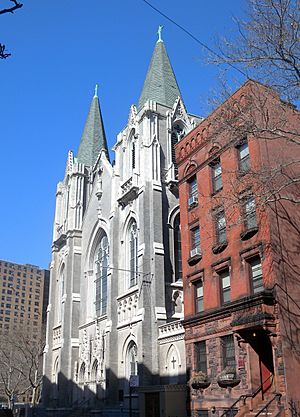Emerson John Moore facts for kids
Quick facts for kids Emerson John Moore |
|
|---|---|
| Auxiliary Bishop of New York | |

St Charles Borromeo Church, Harlem
|
|
| In Office | 1982–1995 |
| Orders | |
| Ordination | May 30, 1964 |
| Consecration | September 8, 1982 by Cardinal Terence Cooke |
| Personal details | |
| Born | May 16, 1938 Harlem |
| Died | September 14, 1995 (aged 57) Hazelden Foundation |
| Nationality | American |
| Denomination | Roman Catholic |
| Education | Cardinal Hayes High School |
| Alma mater | Cathedral College |
Emerson John Moore (born May 16, 1938 – died September 14, 1995) was an African-American leader in the Roman Catholic Church. He served as an auxiliary bishop for the Archdiocese of New York from 1982 to 1995. Bishop Moore was the first African American to become a monsignor and the first to serve as a Catholic bishop in New York.
Contents
Biography
Early Life and Education
Emerson Moore was born in Harlem, a neighborhood in New York City. His father worked as a subway motorman, and his mother was a hospital nurse. He grew up in the Bronx, where he went to Cardinal Hayes High School.
When he was 15 years old in 1953, he decided to become a Catholic. He had been raised in a Baptist family before this.
Moore studied to become a priest at Cathedral College in Manhattan. He also studied at St. Joseph's Seminary in Yonkers. Later, he earned advanced degrees from Columbia University and New York University.
Becoming a Priest
On May 30, 1964, Emerson Moore became a priest. Cardinal Francis Spellman ordained him at St. Patrick's Cathedral. After becoming a priest, he worked at St. Augustine Church in Ossining. He also served at the Church of the Holy Family in Manhattan.
In 1968, Moore joined the National Black Catholic Clergy Caucus. This group described the Catholic Church in the United States as a "white racist institution." In 1969, he became the director of the Lt. Joseph P. Kennedy Jr. Memorial Community Center. He also directed the central office of Catholic Charities in Harlem. He also started the Office for Black Ministry in the Archdiocese of New York.
In 1975, Moore became the pastor of St. Charles Borromeo Church. This church is often called "Harlem's Cathedral." Cardinal John J. O'Connor once said Moore was "the most popular preacher in town." In 1978, Moore was given the title of monsignor. He was the first African American to receive this honor. In 1979, Moore welcomed Pope John Paul II to Harlem. The Pope gave a speech to African Americans at St. Charles Borromeo Church.
Serving as a Bishop
On July 3, 1982, Pope John Paul II chose Moore to be an auxiliary bishop of New York. He was also named the titular bishop of Curubis. He officially became a bishop on September 8, 1982. Cardinal Terence Cooke led the ceremony. Archbishop John Joseph Maguire and Bishop Harold Robert Perry also helped.
Bishop Moore was the sixth African American to serve as a Catholic bishop in the United States. He was the first to serve in the Archdiocese of New York. As an auxiliary bishop, he continued to be the pastor of St. Charles Borromeo until 1989. He also worked as a leader for Black Catholics in the archdiocese. He was on the board of Catholic Relief Services. He also chaired the Africa Development Council. He was a member of the New York State Commission on Government Integrity.
During the 1984 presidential election, Moore supported Democratic civil rights activist Jesse Jackson. He believed Jackson was "the only one forcing people to look at hard issues." That same year, he was arrested with City Clerk David Dinkins. They were protesting against apartheid outside the South African consulate in Manhattan. In 1990, he was the only bishop to sign an appeal from Call to Action. This group asked for big changes in the Catholic Church. These changes included allowing ordination of women and ending clerical celibacy for priests.
Later Life and Passing
Bishop Moore faced some health challenges during his life. He sometimes needed time away from his public duties for treatment. He passed away in 1995 at the age of 57.
After his death, the Archdiocese of New York made an official announcement. They stated that his death certificate listed "natural causes of unknown origin." Cardinal O'Connor spoke about Bishop Moore's funeral at St. Patrick's Cathedral. He talked about the difficulties Moore faced as an African American bishop in the Catholic Church. He said that a Black bishop was expected to be "extraordinarily intelligent" and "preach brilliantly." He added that if a Black bishop spoke with pride of being black, he might be called "racist." If he supported civil rights, he might be seen as "a threat." Cardinal O'Connor's words highlighted the high expectations and unique challenges Bishop Moore experienced.
Images for kids


